Wonder why your team missed their Q2 launch date?
Could you have spotted the red flags earlier?
Projects never fail out of the blue — there’s always a good reason behind the flop.
According to Project Management Statistics for 2025, 12% of all projects are rated as failures — and there are a number of reasons why.
Here’s our list of the 8 most common reasons followed by practical solutions.
Keep reading to check them out.

- 12% of all projects fail.
- There are 8 main reasons for project failure including: unclear goals and objectives, poor resource planning, poor communication, scope creep, unrealistic expectations, lack of project monitoring, lack of clarity, and lack of visibility.
- Reliable project management software like Plaky can help you avoid issues and prevent project failure.
When is a project considered a failure?
A project is considered a failure in situations when:
- It doesn’t meet the initially set goals and objectives,
- It doesn’t deliver what was agreed on time and/or within budget,
- It fails to deliver the expected quality, and
- It doesn’t reach the projected ROI targets.
Failure always leaves a bitter taste in the mouth, even though there are successful projects that experienced missed deadlines or budget overruns.
Still, you can’t just sit back and hope for the best-case scenario. It’s vital to think about the reasons that led to failure and how to avoid the same outcome again.
Have a look at the 8 most common reasons for project failure and their solutions.
8 reasons why projects fail (and workable solutions)
As a project manager, you’ve probably gotten your fingers burnt once or twice. Luckily, with some strategic planning and simplified processes, you can prevent project failure with minimal effort.
#1 Unclear goals and objectives
Unclear goals and objectives are the first on the list with good reason. Without clearly defined goals and objectives, you set the groundwork for failure from day one because:
- Your team won’t have the right direction,
- You won’t be able to allocate resources (time, budget, people) properly,
- You’ll hardly prevent scope creep,
- You won’t be able to determine KPIs and measure how well the project is doing when compared against intended goals, and
- You won’t be able to establish clear expectations.
Clearly, every step of the way depends on how you set up goals and how you communicate them with your team and stakeholders.
What’s the solution?
The solution is easy — set clear goals and objectives from the start.
What’s more, it’s best to include them in your project management plan. Aside from goals and objectives, make sure this plan also covers elements like project resources, deliverables, and project timeline.
Also, a great way to align your team is to invite them to help you with the goal-setting process. As long as your goals follow the S.M.A.R.T criteria, your team will know which way to go from day one.
One of our contributors, Alan Zucker — an experienced PMP professional and project management consultant — explains the importance of using proven practices in project planning:

“Delivering a successful project is not magic. It requires returning to basics and following foundational practices that lead to predictable outcomes. Before a project starts, the first step is to understand the ‘why’ and the ‘what‘ clearly. Why are we doing this project? What outcome are we trying to achieve? How will success be measured? Until stakeholders agree on these questions, no work should begin — no code written and no shovel in the ground.”

#2 Poor resource planning
Resources like people, time, budget, space, and equipment are the driving force behind your projects. If you miss to allocate resources properly (and balance them the right way), you’re on a good path to face problems like:
- Over- and under-worked team members,
- Skill mismatch,
- Missed deadlines,
- Budget overruns,
- Misallocated tech equipment,
- Late reports and documentation, and more.
In addition, there are many situations such as budget cuts, technical failures, or sick leaves that you simply can’t predict. Whether you like it or not, such issues can turn your plan upside down.
What’s the solution?
Plan your resources in advance, and keep track of them in one unified space. The best way to do this is by using project management software, which is ideal if you want to:
- See a real-time project progress,
- Get an insight into how much time and money have been spent,
- Assign and reassign team members to tasks, and
- Keep close tabs on deadlines.
Tracking your resources will give you real-time insight into how resources are spent and help you with decision-making and prioritization.
With Plaky, you can have all your project information in one centralized hub and invite your team members to the project board to enhance cooperation and communication. Everyone involved can track progress, stay accountable, and have important project info at their fingertips.
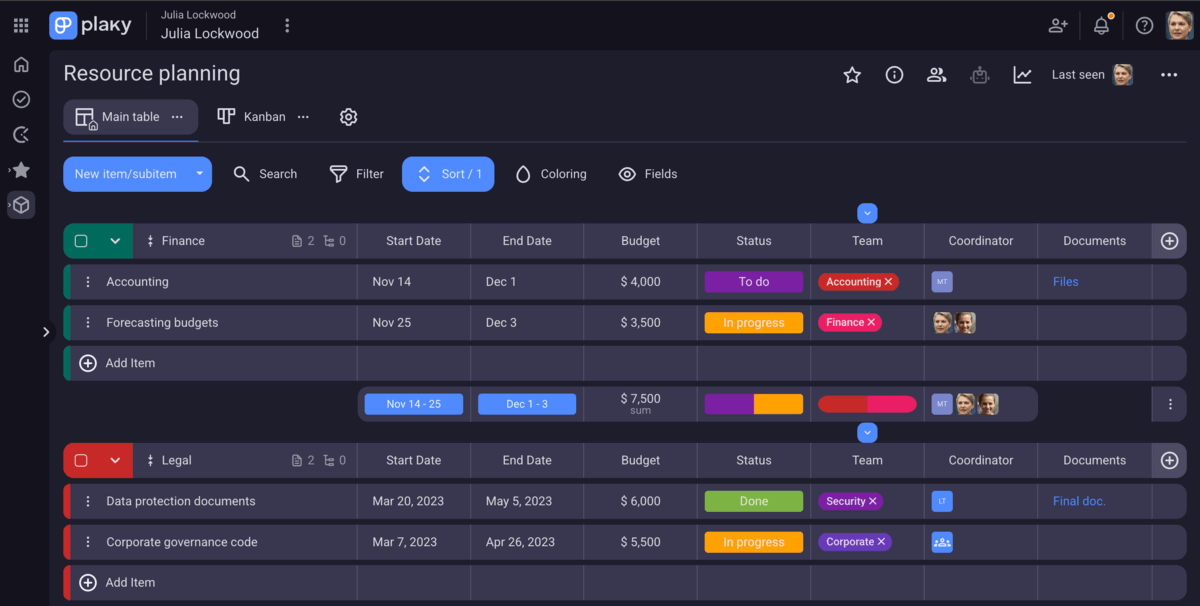
#3 Poor communication
Poor communication is often blamed for missed deadlines, decreased productivity, stressed teams, and much more.
According to the Workplace Communication Statistics in 2025, 86% of survey respondents agreed that ineffective communication is the main reason for workplace failures.
Now, bad communication can stem from various sources. For example, your team doesn’t know who they should contact when problems arise, or when and how they should share updates.
It’s also possible that team members use different channels to communicate progress so important information gets siloed in emails, chats, or internal folders.
Communication breakdown often leaves project managers without clear understanding of project progress. And, without up-to-date information, it’s quite easy to fall into a “Yes trap”. Under the false impression that there’s more than enough time or money, you agree to every request your stakeholders make — until it becomes too late.
What’s the solution?
Set up the rules for project communication at the very start of the project. This also means drawing up a communication plan so that everyone involved, including stakeholders, knows who their points of contact are, and which tools to use for what.
Whether you use email, video calls, shared files, or a team chat app, it’s essential that everyone gets the necessary information in time so that they can have their work done.
However, the best way to keep project communication centralized is, again, a reliable project management tool.
For example, with Plaky you can leave comments and files for every single project task you’re working on. This means that all updates, discussions, and activities are safely kept within a task card, so that everyone involved can have access to the latest info.
What’s more, with Plaky, you can include stakeholders as viewers. This way you allow them to see project progress, teams, files, documents, and comments. By keeping stakeholders in the know, your chances to say “No” to certain requests will be much higher.

#4 Scope creep
Every project you work on has 3 main constraints — scope, time, and budget. This trio makes the iron triangle — when the scope changes, it affects the other 2 as well.
However, spotting scope creep is easier said than done.
While small changes here and there are creeping up on you, you don’t even notice how you slowly move away from the original project plan. Before you know it, you go over budget, miss deadlines, and your team gets overworked.
What’s the solution?
Better safe than sorry is a saying that applies well here.
The best course of action to prevent scope creep is to:
- Carefully define the project scope at the very beginning, and
- Document the project scope, and send it to all stakeholders for review and approval.
This way, everyone will be on the same page with what’s included in the project, and, most importantly, what’s not included. Also, you’ll make others think twice about asking for changes, and it will be easier for project managers to fill the translation gap when they need to explain to stakeholders why a project failed.

#5 Unrealistic expectations
The job of project managers is to make sure their teams stick to the plan, right?
However, stakeholders and clients often expect projects to be done quickly and cheaply and yet to be of a high quality. Even worse, the company management may attract a client by promising an impossible-to-meet deadline or lower project cost but with a reduced team.
And, while you’re trying to make everyone happy, it’s easy to fall into the trap of a planning fallacy. You tend to underestimate your team capacity, demand impossible timelines, or shift goals hoping for the best case scenario. But, what you usually end up with is a project that falls short of the mark.
We also reached out to Aimee Simpson, a director of Product Marketing, to ask her what usually happens when you’re forcing fast, cheap, and good. Here’s what she told us:

“When you push for all three at once, you tear a project in 3 completely different directions. Of course, there are situations where this can work out. But realistically, you’re going to be left with a sub-par final product. Would fast or cheap work be worth it if you’re left with a final project that needs redoing? Suddenly additional rounds of edits or project phases don’t seem so fast or cheap.”
What’s the solution?
Set clear expectations from the start and communicate them with your team and stakeholders.
Voice your concerns, and explain what demands are (im)possible to meet and why. Make sure you hold your ground and defend the project plan.
Also, you can use data from similar past projects to prove your point. If needed, break down larger tasks into smaller, and map out what’s expected on each step to support your decisions.
In Plaky, you can easily create subtasks and even divide tasks into task groups that would represent a particular project stage. This way you can idiot-proof your project lifecycle so that everyone involved understands what needs to be done, how much it would cost, and who is accountable for each task.

#6 Lack of project monitoring
When done properly, project monitoring allows project managers to constantly assess the project’s health so that they could track key metrics, catch issues early, and reach project goals.
But, whether it’s the lack of skill, organizational policy, or technical gaps, project managers tend to avoid monitoring, which usually results in:
- Delays,
- Budgets overruns,
- Poor quality,
- Wasted resources,
- Loss of focus,
- Unidentified risks, and much more.
With one, two, or all of these issues involved, it’s always problematic to get control back.
What’s the solution?
As a project manager, you need to develop a system for project monitoring and, most importantly, adapt it to the project you’re running.
No project is the same, so make sure you establish appropriate KPIs at the very start that will later help you monitor:
- Timeline,
- Budget,
- Workload,
- Performance,
- Quality, and
- Risks.
Effective monitoring helps you detect problems early, make alignments, and reach informed decisions. It’s good practice to communicate with stakeholders during this process and keep them in the loop.
What’s more, you can capture lessons learned throughout the monitoring phase to ensure continuous improvement. This way, you get immediate insights into recurring mistakes, identify root causes of emerging issues, and course-correct your team dynamics to prevent the groundhog day effect.
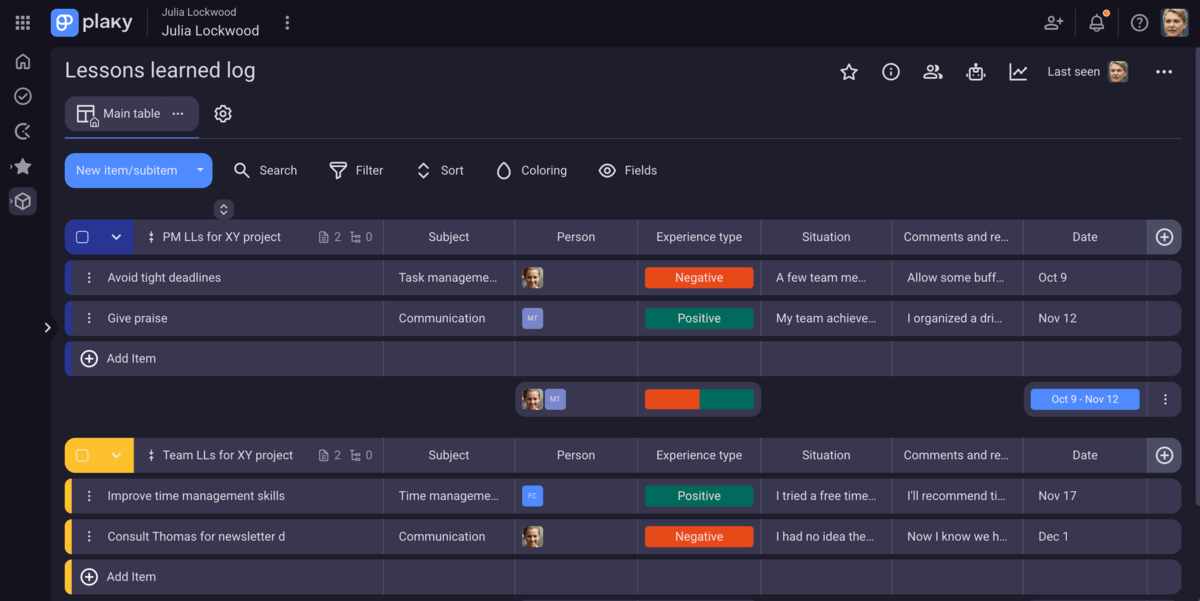
#7 Lack of clarity
Before you even start with project planning, you really need to provide a clear understanding of what’s expected, right?
Still, many projects fail due to the lack of clarity.
This usually happens when the FFE (Fuzzy Front End) process doesn’t provide concrete results, and therefore project managers end up creating a project plan based on vague requirements.
The lack of clarity typically results in:
- Unclear goals,
- Different interpretations of available data,
- Unclear customer needs,
- Ad-hoc projects,
- Uncoordinated deadlines, and more.
In a nutshell — your project failed before it actually started.
What’s the solution?
You should know that clarity directly depends on the effective management of the FFE process. The aim is to provide clear guidance and minimize ambiguity and uncertainty.
It’s essential to use the FFE process to convert vague ideas into clear points. This will allow you to create a solid project plan that will actually work.
And, once you’re ready to draw up your project plan, the ideal way to do it is to use Plaky.
Plaky allows you to easily set up a project board where you can list tasks and use custom fields to add necessary details like date, person, status, text, etc. This way you can categorize project information the way you want to ensure efficient tracking and management of data.
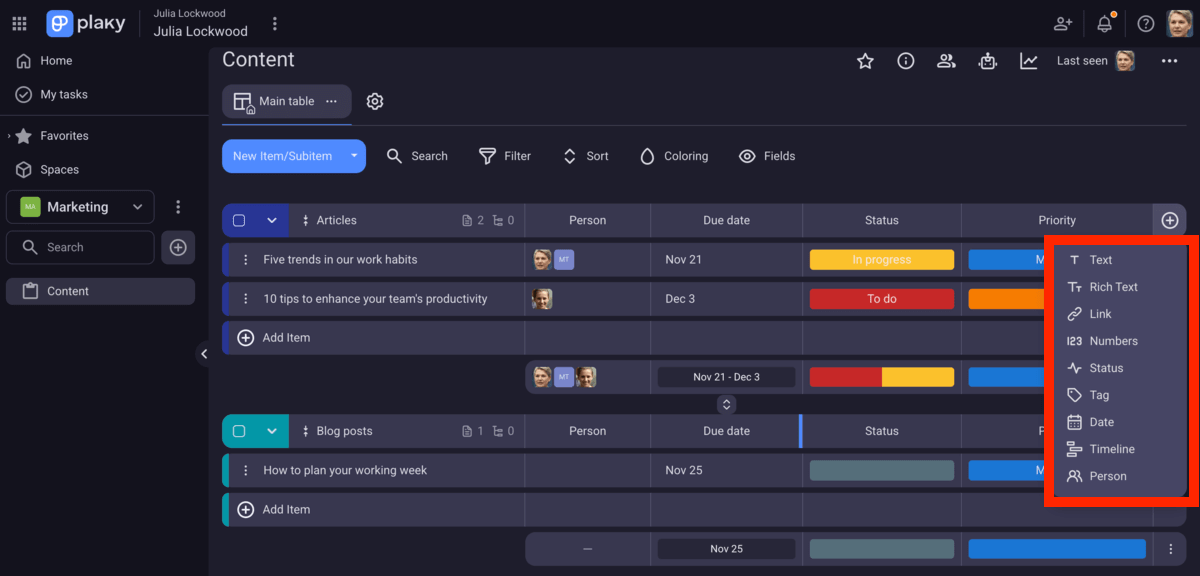
#8 Lack of visibility
As your project moves forward, documentation, files, and updates just pile up. Important data is easily overlooked, files are misplaced, and you have no clue what the latest version of that newsletter is.
The lack of project visibility usually leads to:
- Extended deadlines,
- Budget overrun,
- Rework,
- Resource conflicts,
- Unnoticed bottlenecks,
- Compromised quality, etc.
With no transparency and real-time updates, it’s easy to miss the warning signs that would reveal incidents and crises fatal to your project.
Aside from that, no visibility means that you can hardly see what’s below the surface, like typical patterns and trends that slow your project down (e.g. regularly extended deadlines for a specific tasks, or feedback sent behind schedule).
What’s the solution?
Ensure that everyone gets real-time information about the latest changes and updates. What’s more, people involved in the project must have access to current project status, deadlines, overlapping tasks, and task owners.
With all relevant project information available, your team is always on the same page and able to understand project reality.
As a cloud-based platform, Plaky allows you to track project progress anytime and anywhere. With real-time notifications, your team can immediately receive updates about changes made to tasks and boards, so they never miss a thing.
What’s best, Plaky offers 4 different board views (Table, Kanban, Gantt chart, and Chart) that give you the chance to see your project from different perspectives, spot issues, and make timely and effective decisions.
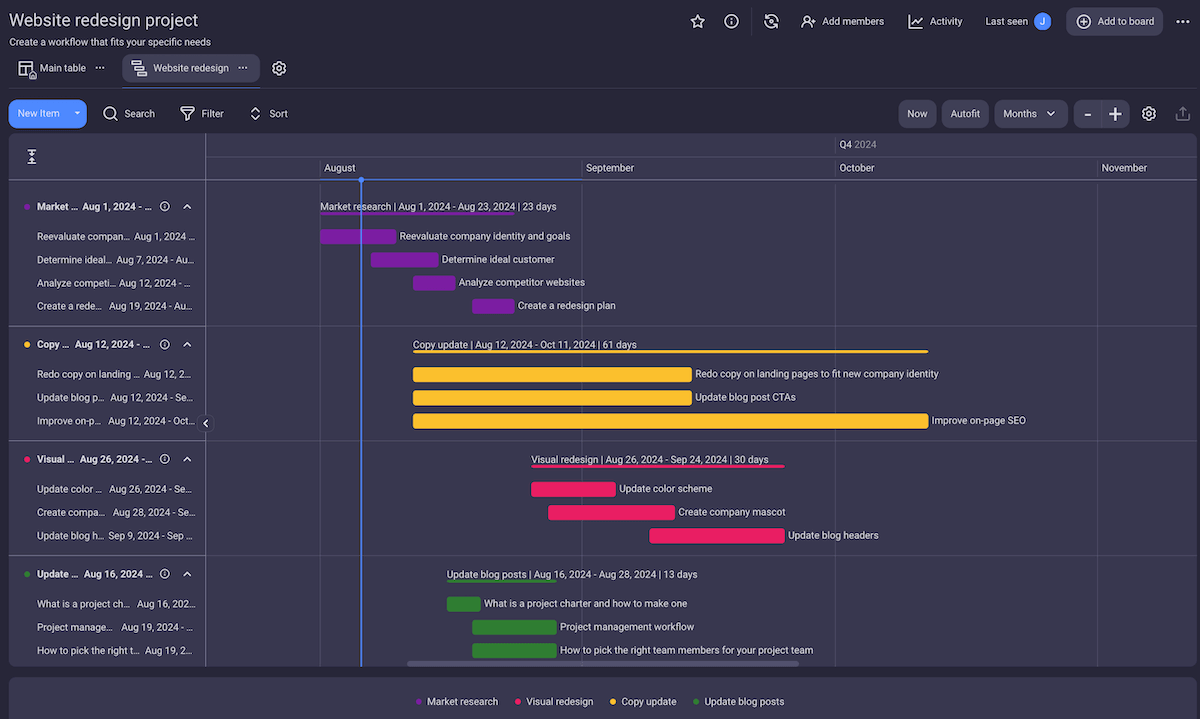
Safeguard your projects against failure with Plaky
A project failure is a bitter pill to swallow for any project manager. However, no project is fail-proof.
The only chance to keep your project under control is to use a tool like Plaky as it helps you with:
- Task management — Track task status, get chronological record of task activities through Plaky’s activity log, easily assign the right people to the right tasks, and apply labels for easier sorting and filtering of current tasks.
- Team collaboration and communication — Make comments and replies, give feedback, and share files within a dedicated task card so that nothing gets lost.
- Progress tracking — Use 4 different views to see your project from different angles depending on what you want to keep an eye on. Highlight tasks with approaching deadlines with Plaky’s conditional coloring feature.
- Administration — Create spaces for different teams, build and customize project boards, and easily manage user roles and permissions.
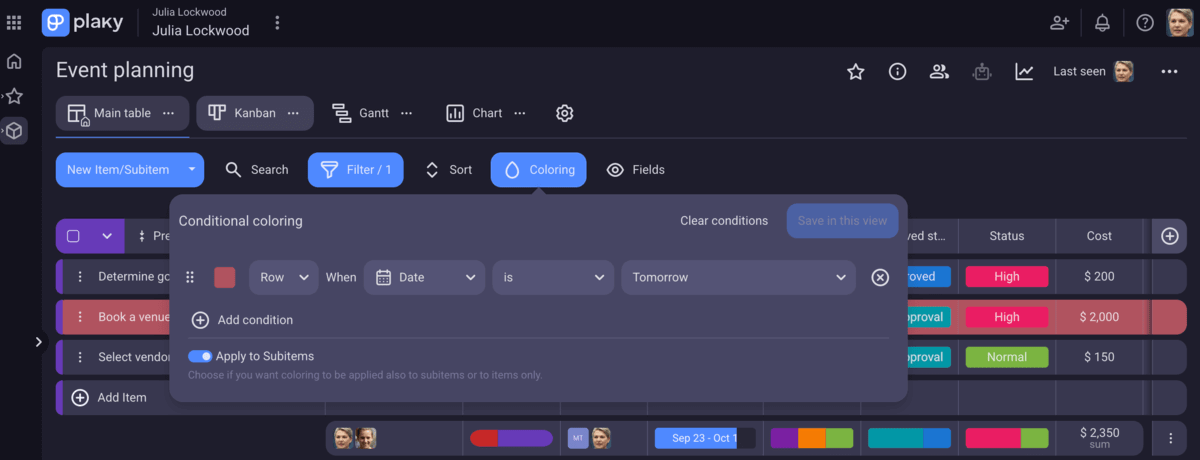
Plaky offers everything you need to manage and monitor your projects round the clock. But, that’s not all.
As a Plaky user, you can have a built-in time tracker for all your tasks thanks to Plaky + Clockify integration. This will help you measure the time spent on tasks and eventually spot behaviour patterns that might cause problems.
Another plus?
Add Plaky’s integration with Pumble to wrap up the whole story and boost communication. This integration enables getting chat notifications whenever there are changes on Plaky’s tasks or when Clockify time-off requests and timesheets get approved. Neat, right?

And, now you probably think that you’ll have to break the bank to get Plaky and these powerful integrations, right?
The truth is — you can have all of it completely free of charge!
Plaky offers all basic project management features for free, and to integrate it with Clockify and/or Pumble, you only need to open accounts on these 2 platforms — which are also free.
It’s good to know that with Plaky there’s no limit on what you need most — users, spaces, boards, and tasks. And, if you need advanced features like Gantt chart, bulk actions, or viewer roles, you can opt for one of Plaky’s affordable paid plans.
Stop project failure in its tracks! Sign up for Plaky today!

